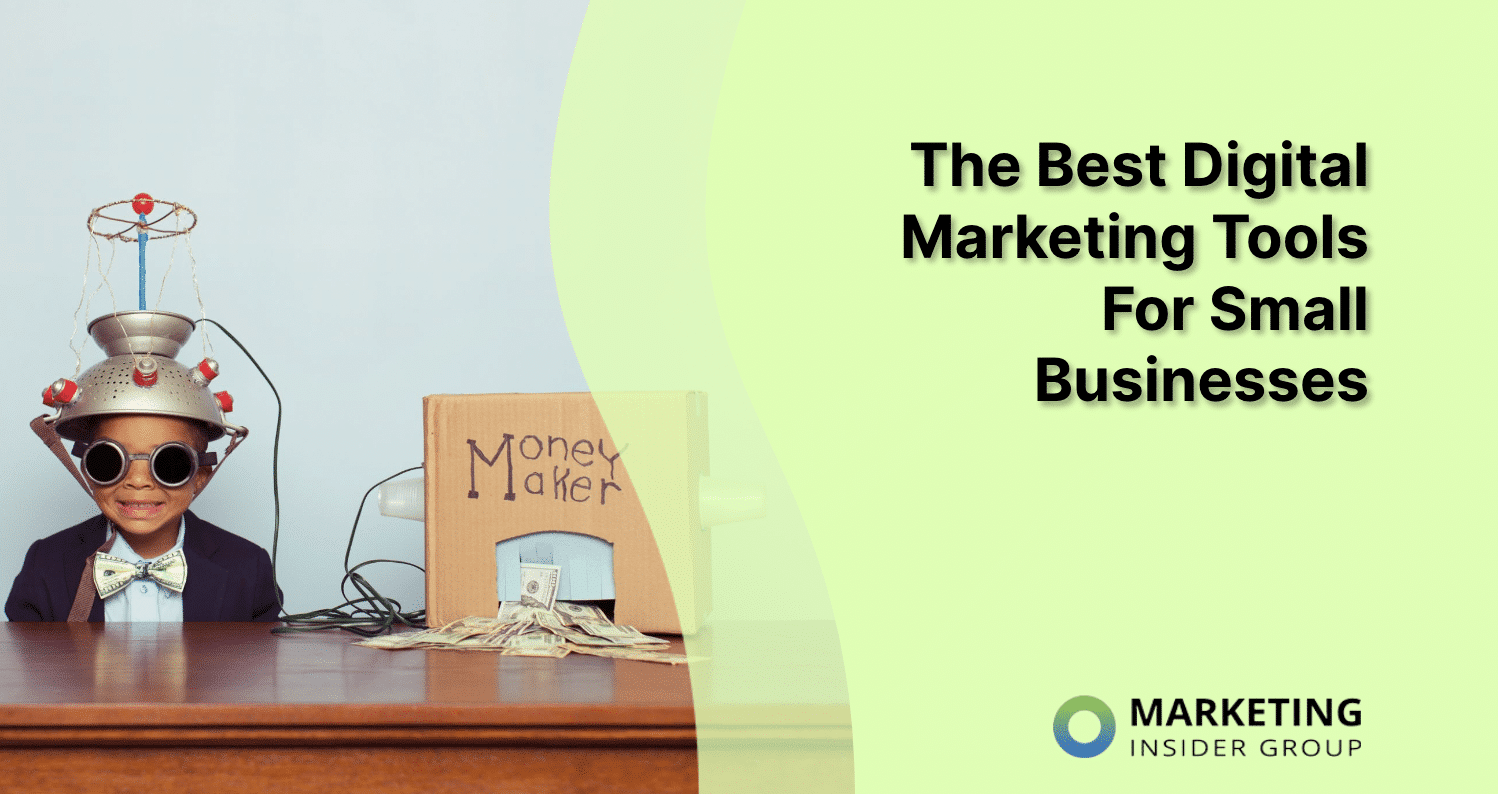
The 10 Best Digital Marketing Tools for Small Businesses
One of the most exciting aspects of digital marketing is how it levels the playing field for smaller businesses and solopreneurs.
If you have an incredible product or service concept, you have plenty of affordable and user-friendly tools to reach new audiences and market your brand.
Gone are the days when a multimillion-dollar marketing budget is necessary to get ahead of your competitors. Digital marketing offers a high ROI whether you’re investing cash to outsource the job or bootstrapping by investing your own time.
Beyond the potential of great returns for small budgets, countless digital marketing tools out there can take some of the workload off your shoulders. These tools are especially valuable for small businesses that don’t have the resources to dedicate a team to in-house marketing, or the budget to outsource the work to a marketing agency.
Quick takeaways:
- Some digital marketing tools are all but mandatory for tasks like researching keywords, brand monitoring, email automation, and more.
- Most tools offer both free and paid options. Some tools offer consistent freemium versions with limited features while others offer free trials of the full version. Plan a specific budget for your tools and add more as ROI comes in.
- Plan your tools based on your brand’s goals for your digital marketing strategy. It helps to have a dedicated tool for each task like keyword research, content research, and social media. However, some tools offer a full suite of relevant features to cover almost everything.
In my first CMO role for a small business, I found that thought leadership, effective content marketing and publishing consistently were the quickest and most affordable ways to achieve marketing ROI.
PS – I put together these 10 tips for optimizing your content marketing. Watch Now!
But we needed a way to measure the traffic gains, promote the content, capture leads, and conduct continuous research of our buyer search trends. So here is a list of the top digital marketing tools we have used as a small business to achieve 2-3X growth every year for 5 years.
These digital marketing tools can help you to get the biggest bang for your buck and ensure your precious time is invested wisely: automating repetitive tasks, collecting data for you to analyze and optimize your campaigns, and helping you to organize and plan your marketing activities, and more.
If you’re ready to go the DIY marketing route, these tools are a must for reaching the right audiences for your brand, creating relevant content for your audience, and nurturing leads to buy.
1. Google Analytics

Google Analytics is completely free software that provides valuable insights into who is visiting your website and how they engage with it.
It’s best paired with Google Search Console – another free digital marketing tool that helps you to identify any problems on your site and optimize it for traffic.
Some of the data points that Google Analytics makes available to you include:
- The number of visitors to your site by day, week, month, or any time period you choose
- Where these visitors are coming from – referrals from other website, organic search, ads, social, or direct
- The keywords people are using in Google to find your site
- The demographics and interests of your users
- How long each user spends on your site and which pages they visit
All this information is interesting, but it’s also vital knowledge that can help you to optimize your website and marketing campaigns (while keeping your SEO efforts low cost).
For example, you might notice through Search Console or Analytics that you’re getting a lot of traffic from a keyword that you lack content covering. Write a blog post optimized for that keyword and watch your traffic and engagement levels rocket.
Getting loads of visitors from Facebook but none from Twitter? Maybe this is a sign you should concentrate your marketing efforts on your main channel.
It’s all about the insights – not just the analytics.
2. Mailchimp
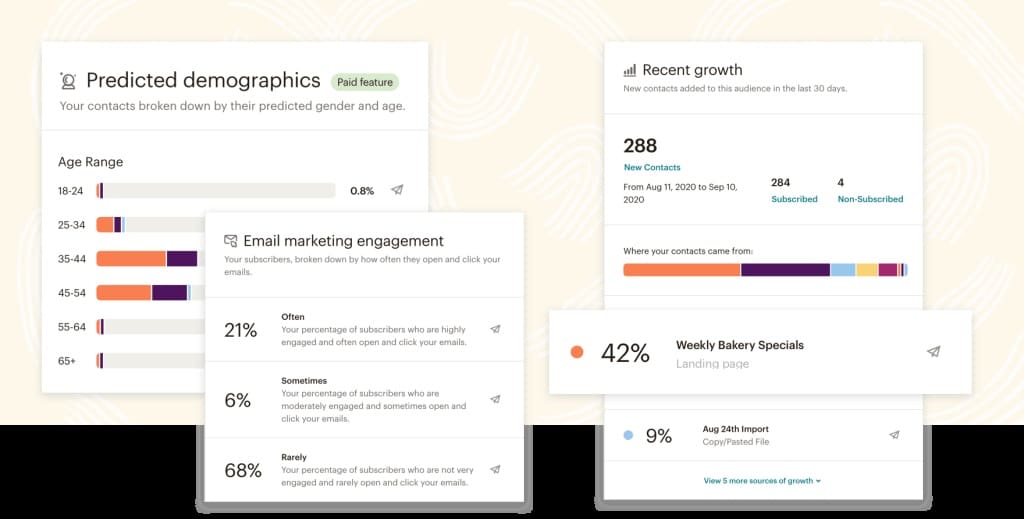
No matter how large or small your business is, email marketing should definitely be a part of your overall strategy.
When a customer signs up to your mailing list, they’re inviting you straight into their inbox. That’s why email marketing on average offers a higher ROI than any other marketing activity.
To get started with email marketing, you need a service that will enable you to capture emails, manage your lists, send out emails automatically or on a schedule, and analyze engagement.
Mailchimp is an ideal choice if you’re just starting out or if you are running a small business. Mailchimp’s basic service is free until your list hits 2,000 subscribers. It offers the main functionality you need without making managing your email marketing too complex.
Plus, Mailchimp now offers a slew of features and digital marketing tools (some under paid plans):
- Segmentation and personalization
- Landing page builders
- Form builders
- Audience insights
- CRM tools
- Predictive insights
PS – Check out our weekly blog content service to grow your website traffic and leads!
3. Hootsuite
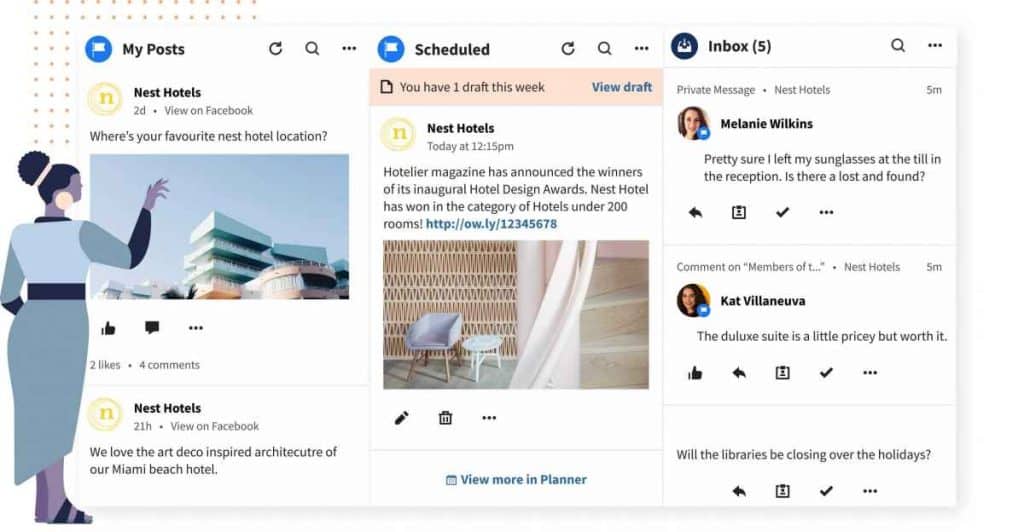
There’s no question. You must maintain a presence on social media to remain competitive in the marketplace. You also probably already know that social media can be a huge time sink, even if you’re using it purely for marketing purposes rather than endlessly scrolling.
Luckily, you have digital marketing tools available to cut down on this time inefficiency, like Hootsuite.
Hootsuite provides a central management platform for all your social media channels and allows you to schedule posts in advance so you can get all your social media content for the coming weeks or months ready in one session.
You also get advanced reporting tools to see which of your social media campaigns are working most effectively and use this data to calculate ROI.
You can also track mentions of your brand and manage responses, all in one dashboard.
Hootsuite also offers tools for promoting your social media posts through the platform now as well.
4. BuzzSumo
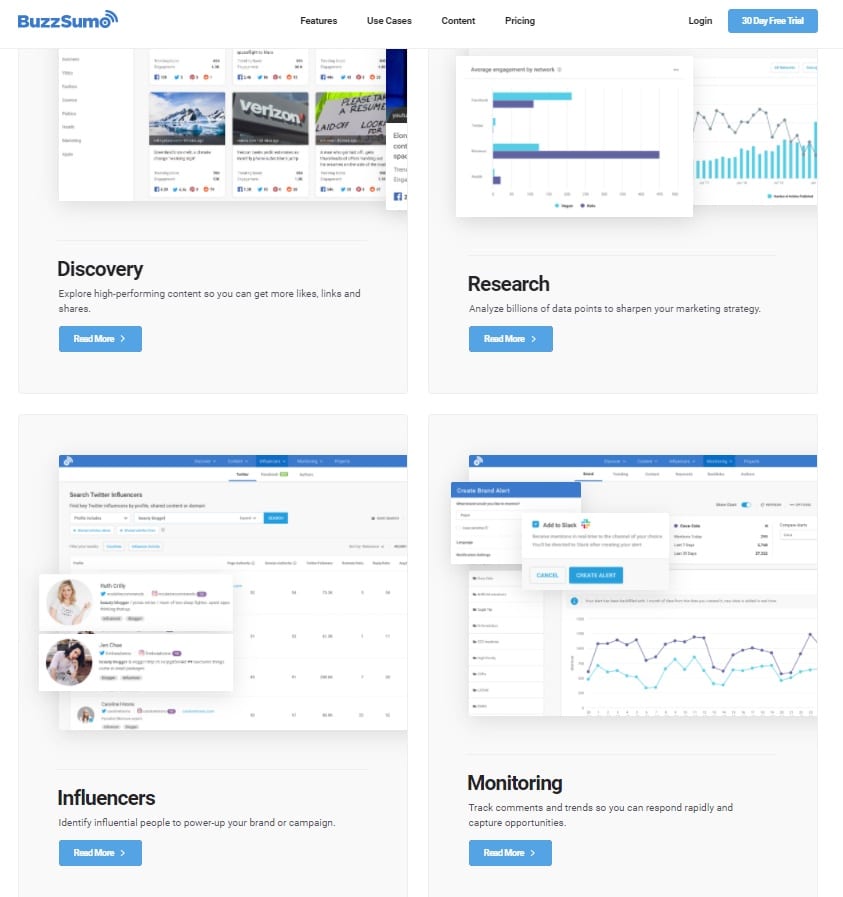
Your content strategy shouldn’t consist of wild stabs in the dark as you cover topics you think your audience will engage with.
That’s why 60% of B2B brands with the most successful content marketing have a documented strategy. Meanwhile, only 21% of the brands with the least successful content say they have a documented strategy.
To be successful in content marketing, you need to do your research properly, and this is why BuzzSumo is one of my favorite content marketing tools.
BuzzSumo shows content that is trending across social media based on searched topics. Following your search, you can analyze the results that are returned to see what’s so appealing about them and to get ideas of subjects to write about.
But BuzzSumo is moving beyond just basic content research and viral posts. Today, BuzzSumo offers tons of digital marketing tools like:
- Keyword research
- Influencer search
- Topic-based social media feeds
- Content analysis
- Crisis management
- Brand monitoring tools
5. KWFinder
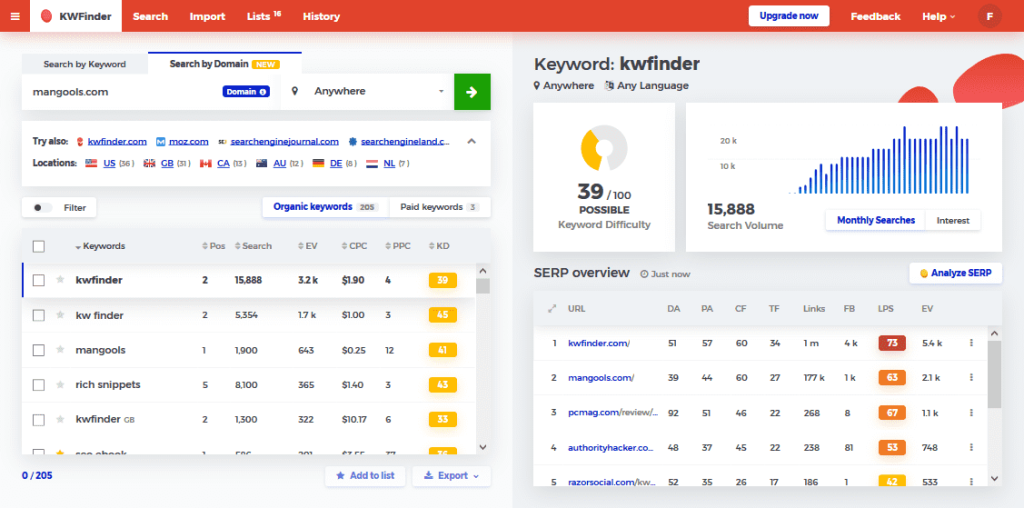
SEO is a fundamental of online marketing and it’s important to get right. Not only should you make sure your site is structured properly and optimized for mobile, the content you produce must also contain relevant keywords that you have a good chance of ranking for in search results.
You need a special digital marketing tool to find those relevant keywords and start your search. You have several options available from the free Google Keyword Planner, to more complex suites of tools like SECockpit.
The more advanced digital marketing tools get quite expensive, with monthly subscription fees starting at $100 or more. However, options like KWFinder offer affordable, accurate, and useful insights at a perfect price point for small businesses.
Just put in a seed keyword and the tool will come back with hundreds of suggestions, search volume data, trends, and a ranking difficulty score for each word or phrase.
Mangools, the brand behind KWFinder, offers plans for individual tools or its full suite which includes a backlink tool, website analysis, SERP watchers, and more inside each one – along with a nice browser extension.
PS – Check out our latest case study that shows how we helped one company double their leads!
6. HubSpot
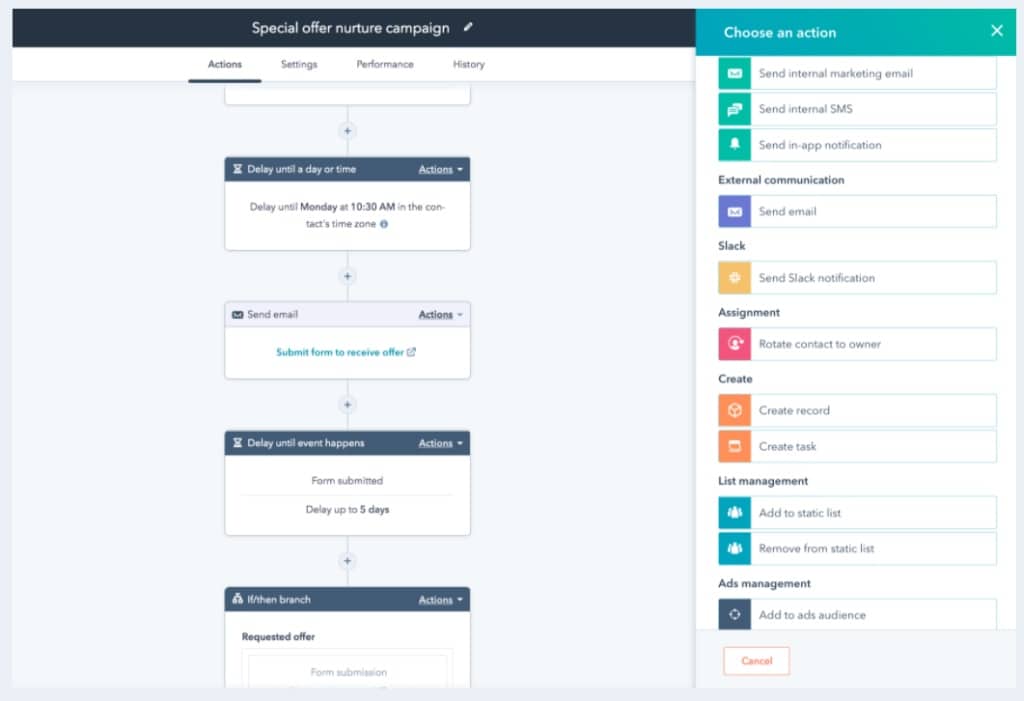
If you’re running multiple campaigns across numerous marketing channels, not only is it a huge challenge to manage them all, but you also have to figure out exactly what’s working and where to make improvements.
HubSpot is an all-in-one marketing software solution that enables you to bring all your different marketing channels together, and optimize for more traffic, a higher conversion rate, and better ROI.
The tool includes optimized templates that are ideal for creating landing pages along with other features like live chat and user action events which ramp up your engagement and convert more visitors into customers.
Other features of HubSpot include:
- Content optimization tools
- Optimized landing pages
- Email templates
- Marketing automation
- Lead management
- Analytics
- Social media management
The full version of HubSpot has a hefty price tag but small businesses on lower budgets can get started with their free or basic package.
HubSpot has also made the switch from an inbound marketing tool to a complete CRM platform, now offering free and paid sales hubs, customer service hubs, and content management (on top of the free/paid marketing hub).
However, the complete content management platform is only available in paid versions.
7. Canva
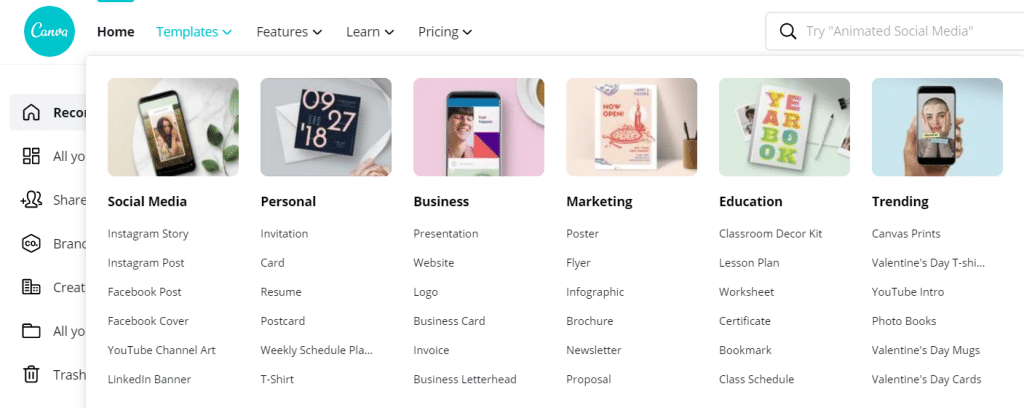
You need visuals to keep your audience engaged.
For example, you could use quality photos to keep your readers interested, come up with motivating quote graphics, visualize complex data with colorful graphs, and create highly engaging infographics.
Now, what if I told you that there is an awesome tool that will help you create original, visually appealing content in just a few minutes? Of course, I’m talking about Canva!
Canva keeps evolving, offering more graphic design tools and templates all the time: social media, infographics, marketing posters, business cards, eBooks, and anything else you could possibly need.
And Canva’s free templates (and entire freemium version) are actually useful too!
Use photos already featured on the site, upload and polish up your own images, or even create brand new ones.
Most importantly, you don’t need to have any graphic design experience to create high-quality graphics. With its easy-to-use drag and drop features, Canva arms you with a wide range of photo editing options, color palettes, font combinations, effects, and custom image sizes.
8. Ahrefs
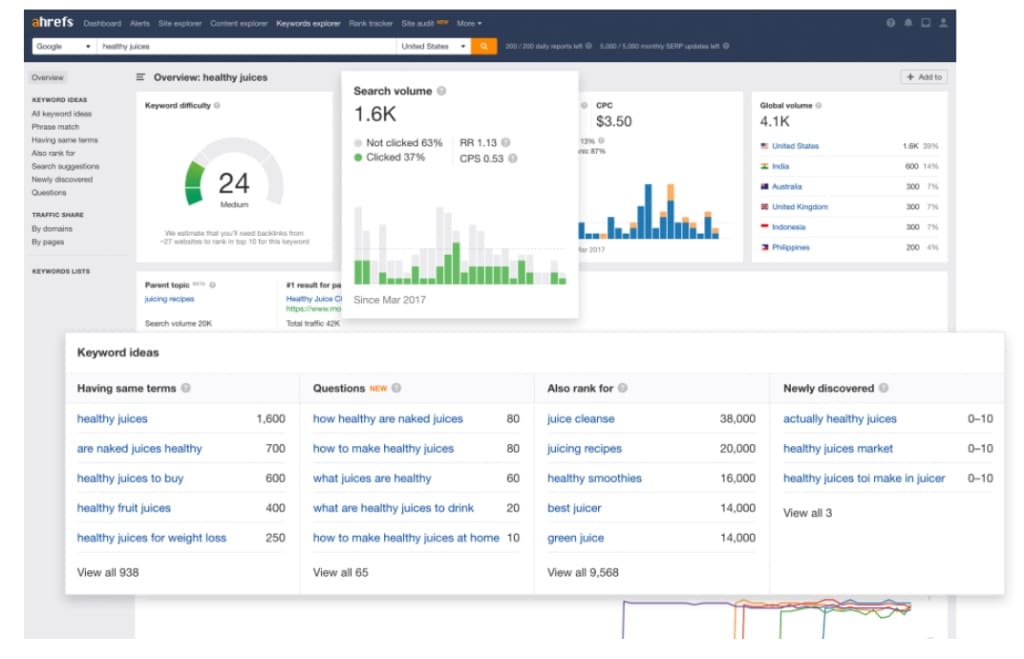
While old-school SEO was all about building backlinks, modern SEO practices are focused on understanding the search intent of keywords you can actually rank for, and building relevant and organic backlinks from authority sites.
With quality links leading to your content, search engines will know how authoritative and trustworthy your website is. That’s why off-page backlink analysis is the backbone of your digital marketing strategy.
Now, even with a plethora of amazing tools, Ahrefs is the one and only for many digital marketers.
With Ahrefs, you can do competitive analysis and see the keywords your competitors rank for in organic search results, find the best keywords ideas, access your backlink data instantly, find content relevant to your niche, keep track of your desktop and mobile keyword rankings, and get alerted whenever one of your competitors gets or loses a backlink.
Ahrefs has improved much over the years, now offering comprehensive tools for:
- Website analysis and backlink profiles
- Keyword research
- Website auditing for keyword gaps and performance issues
- Rank tracking to follow your performance over time
- Content explorer to stay on top of your niche
9. Slack
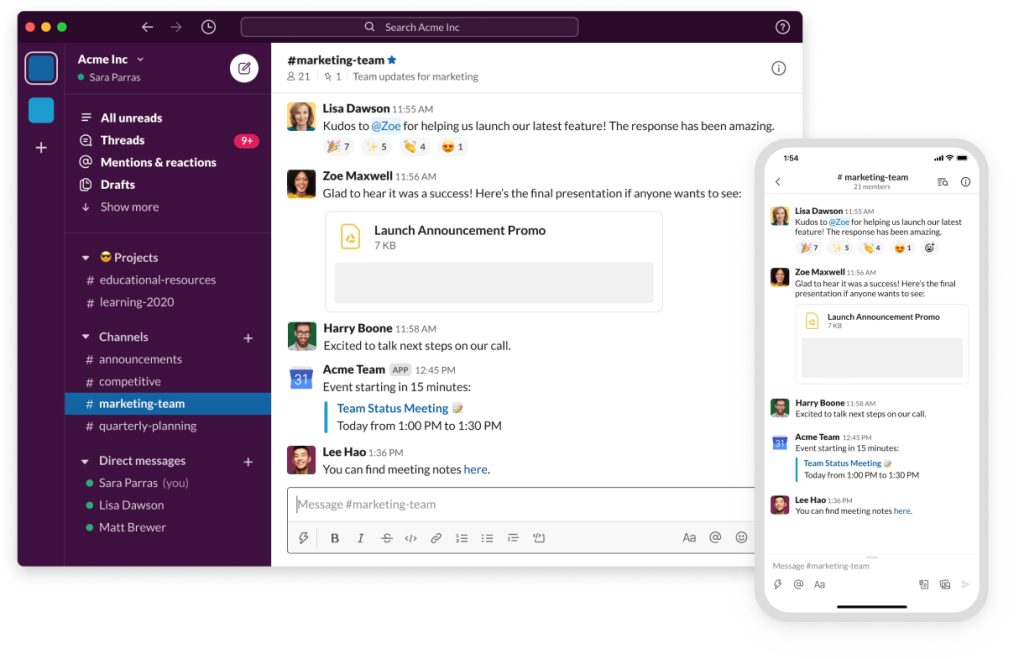
In the world of digital marketing tools, the success of any project hinges on the ease of communication between teams. That’s why you should invest in easy-to-use software that provides your team with uninterrupted interaction and data sharing.
One of the most popular team collaboration platforms is Slack. This sweet tool has won the hearts of many digital marketers thanks to its simple data sharing and easy message search options.
Most importantly, Slack can integrate with all major project management, office management, sales, productivity, design, and developer tools, making it easier for you to stay on top of every aspect of your digital marketing campaign.
10. Yoast
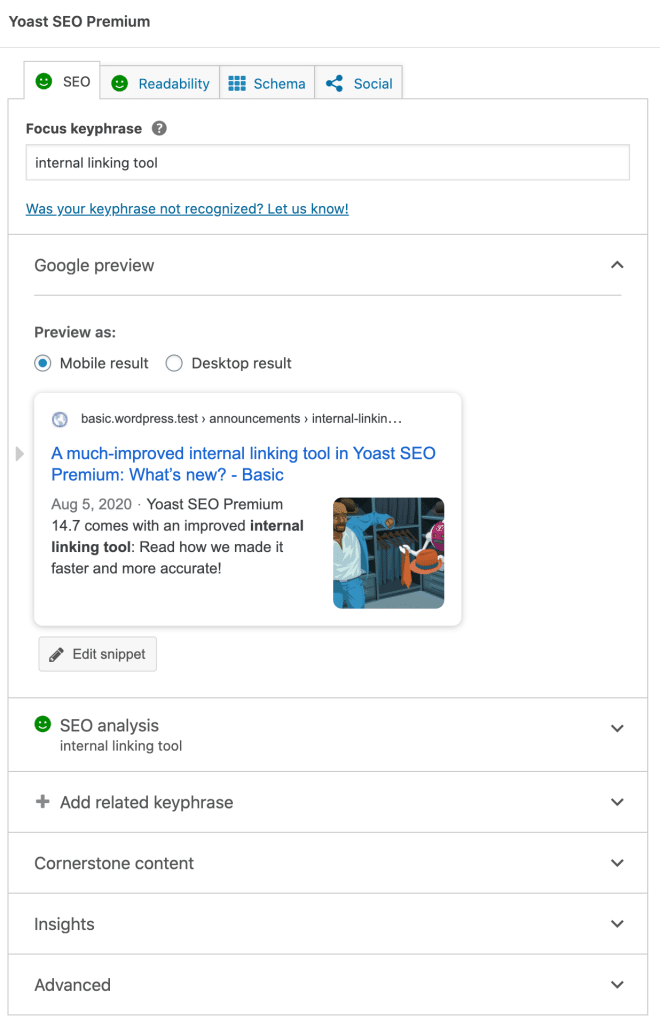
What use are all the hours you spend researching keywords and topics worth if you don’t properly optimize your content? Even the best of us forget things once in a while.
Yoast is one of the best digital marketing tools for optimizing content for SEO because they offer an awesome free version. Yoast will tell you where to place your keyword, how to improve readability, and perhaps most importantly, let you know what you’re doing wrong so you can improve.
With the paid versions, you can add related keywords, search for semantic keywords within the plugin, get instant internal link suggestions, insights, and more.
Try the free version of Yoast for a while to familiarize yourself with the features and audit your site’s content. When you’re comfortable, upgrade to the paid version to boost your content even further.
What are Your Must-Have Digital Marketing Tools?
To survive in today’s competitive digital marketing landscape, you need to be intuitive, social media-savvy, and persistent.
Most importantly, you need to be a jack of all trades. Apart from knowing all the digital marketing tips and tricks, you must learn and use a wide range of digital marketing tools to save time and make your work more efficient.
Whether you’re analyzing off-page backlinks or developing a content marketing strategy, these tools will help you not only focus on the aspects of your job that really matter, but also maintain your sanity.
Need a helping hand getting your content marketing strategy off the ground? Check out our custom Content Builder Services to see how we’ve helped other brands enjoy 7x ROI.






